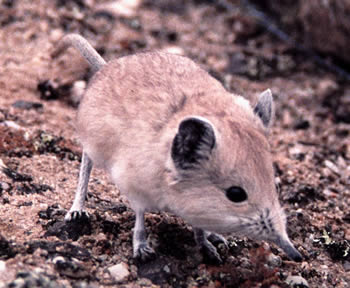Genus Macroscelides no longer monospecific

The round-eared sengis or elephant-shrews (genus Macroscelides) exhibit striking pelage variation throughout their ranges. Over ten taxonomic names have been proposed to describe this variation, but currently only two taxa are recognized (M. proboscideus proboscideus and M. p. flavicaudatus). Based on the geographic distribution, morphology, and mitochondrial DNA sequence of these taxa, the current taxonomy has recently been evaluated. Mitochondrial haplotypes of these two taxa are reciprocally monophyletic with over 13% uncorrected sequence divergence between them. PCA analysis of 14 morphological characters (mostly cranial) grouped the two taxa into non-overlapping clusters, and body mass alone is a relatively reliable distinguishing character throughout much of Macroscelides range. Although fieldworkers were unable to find sympatric populations, the two taxa were found within 50 km of each other, and genetic analysis showed no evidence of gene flow. Based upon corroborating genetic data, morphological data, near sympatry with no evidence of gene flow, and differences in habitat use, the two forms have been elevated to full species: The Namib round-eared sengi (M. flavicaudatus) is endemic to Namibia, whereas the Karoo round-eared sengi (M. proboscideus) is found in Namibia, Botswana, and South Africa. Details can be found in: Dumbacher, J.P., G.B. Rathbun, H.A. Smit, and S.J. Eiseb. 2012. Phylogeny and taxonomy of the round-eared sengis or elephant-shrews, genus Macroscelides (Mammalia, Afrotheria, Macroscelidea). PLoS ONE 7(3):e32410 (12 pp + 4 pp. supplement table).